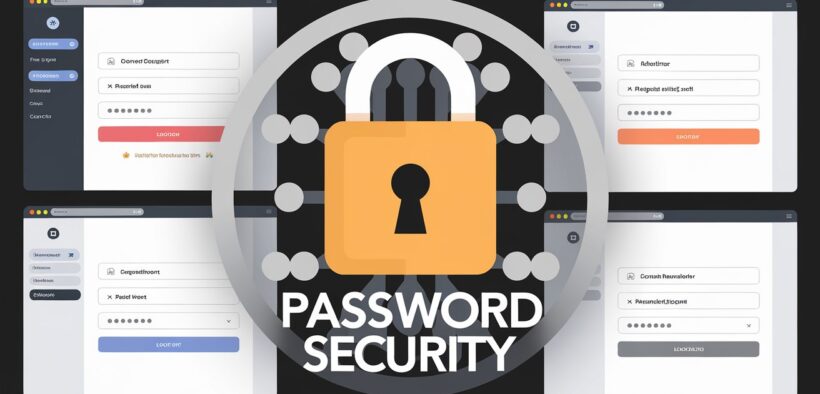9 Essential Rules for Password Security to Keep Your Accounts Safe
Share

When it comes to your online safety, password security is one of the most crucial factors to consider. In today’s digital world, where we juggle multiple accounts—from social media to banking—using a strong, unique password for each account is essential. However, it’s easy to fall into the bad habit of reusing the same login credentials across platforms, which can lead to serious security risks like identity theft or financial loss.
The increasing frequency of data breaches in recent years, including notable incidents in 2023-2024, highlights the need for stronger password practices. With cybercriminals becoming more sophisticated, it’s more important than ever to protect your personal information. Here are nine practical tips to help you create and manage strong passwords, minimize the risk of a breach, and keep your accounts secure.
- Use a Password Manager to Keep Track of Your Passwords
Strong passwords are typically long, complex, and difficult to remember, especially if you follow the best practice of using a different password for each account. This is where password managers come in. A trusted password manager, such as 1Password or Bitwarden, can create and store strong, unique passwords for all your accounts. These tools work seamlessly across your devices, ensuring that you always have access to your secure credentials. While password managers require you to remember one master password, make sure this password is particularly strong and secure. Avoid using personal information or common words, and instead, opt for a mix of letters, numbers, and symbols.
- Writing Down Passwords Can Be an Option
While it may seem counterintuitive, writing down your passwords on a piece of paper can be a viable option for those who prefer not to use a password manager. However, it’s crucial to store this information in a secure location, such as a locked drawer or safe, and limit access to it. Avoid keeping digital copies of your passwords, as they are more vulnerable to theft if someone gains access to your device.
- Check If Your Passwords Have Been Stolen
Data breaches can expose your passwords without your knowledge. To stay ahead of potential threats, use tools like Firefox Monitor, Google’s Password Checkup, or Have I Been Pwned to check if your passwords have been compromised. These services will alert you if your credentials have been exposed in a breach, allowing you to take immediate action to secure your accounts.
- Avoid Common Words and Character Combinations
The best passwords are those that are hard to guess. Avoid using common words, predictable phrases, or easily accessible personal information, such as your name, pet’s name, or birthday. Hackers often use automated tools to guess passwords based on this type of information, so it’s essential to create a password that is unique and unrelated to you.
- Make Your Passwords Longer Than Eight Characters
While eight characters is the minimum recommended length for a password, longer is better. Experts suggest using a passphrase composed of three or four random words. This approach makes your password harder to crack but still relatively easy to remember. If you’re worried about forgetting a long passphrase, consider using a password manager to store it securely.
- Don’t Reuse Passwords Across Different Accounts
Reusing passwords is one of the most dangerous habits you can have when it comes to password security. If one account is compromised, cybercriminals can potentially access all your other accounts with the same credentials. Always use unique passwords for each account to prevent a single breach from leading to widespread damage.
- Avoid Using Passwords Known to Be Stolen
Before choosing a password, it’s a good idea to check whether it has been exposed in previous data breaches. Tools like Have I Been Pwned allow you to enter your desired password and see if it has been compromised in the past. Avoid using passwords that have appeared in breaches, as they are more likely to be targeted in future attacks.
- No Need to Regularly Change Your Passwords
The old advice of changing your passwords every few months is no longer necessary unless you suspect your credentials have been compromised. Frequent changes often lead to weaker passwords, as users may opt for simpler, easier-to-remember combinations. Instead, focus on creating strong, unique passwords from the start.
- Enable Two-Factor Authentication (2FA)
Two-factor authentication (2FA) is an additional layer of security that requires a second piece of information—usually a code sent to your phone—before you can log in. This ensures that even if someone steals your password, they won’t be able to access your account without the second factor. For added security, use an authentication app like Authy, Google Authenticator, or Microsoft Authenticator rather than relying on SMS codes, which can be intercepted through SIM swap fraud.
In today’s digital age, being proactive about password security is essential for protecting your personal and financial information. By following these best practices, you can significantly reduce the risk of your accounts being compromised. Stay informed about the latest security trends and take steps to secure your digital life. If you find that your passwords have been exposed, act quickly to update them and enable additional security measures.






